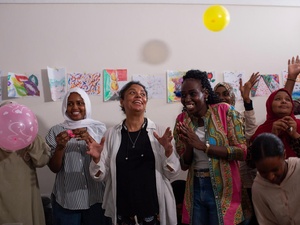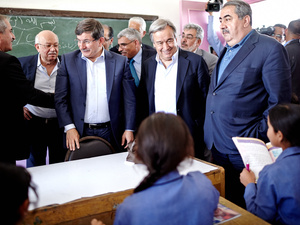UNHCR seeks US$32 million for Libya emergency operations
UNHCR seeks US$32 million for Libya emergency operations

Stranded migrant workers wait in the no man's land between Libya and the Egyptian border post at Sallum.
GENEVA, March 7 (UNHCR) - The UN refugee agency appealed Monday to donors for US$32 million to fund its continuing emergency response operations for the Libya crisis. The bulk of the supplementary funding will be used for protection needs, to support the continuing humanitarian evacuation of thousands of people stuck in Tunisia and Egypt, and for life-saving aid supplies.
"We urgently need the funding," noted Panos Moumtzis, head of donor relations at UNHCR. The amount sought by UNHCR is part of a United Nations flash appeal for US$160 million.
Meanwhile, UN High Commissioner for Refugees António Guterres hailed the success to date of the international effort to evacuate and repatriate thousands of foreigners from Tunisia's border with Libya, but warned that large numbers of people remained at the borders and the displacement problem could return.
He noted that 15,000 Bangladeshi nationals remained stuck at the Tunisian and Egyptian borders after fleeing the violence that erupted in Libya between pro and anti-government forces in mid-February. Under an evacuation programme coordinated by UNHCR and the International Organization for Migration (IOM), tens of thousands of people, mostly Egyptian workers, have been repatriated.
"We are afraid that the situation can get worse in the near future and we might be seeing again large flows of people into both countries," Guterres warned at a joint press conference in Geneva with UN Emergency Relief Coordinator Valerie Amos and IOM Director General William Lacy Swing. "Decongestion [of the borders] has occurred, but we must remain vigilant," Swing said.
Guterres also hailed the "extraordinary generosity" of the people and governments of Tunisia and Egypt in allowing some 200,000 people to seek shelter in their territory after fleeing Libya over the past three weeks.
"In times when we have so many closed borders, so many refoulements [forced return] and pushbacks these two countries gave an extraordinary example," he said, while stressing that "all the people we helped did not want to migrate into the developed world. They just wanted to go back home."
The flow of people coming into Tunisia from Libya continued on Monday but at a much lower rate than seen during much of last week, They were mainly migrant workers, including a large number of Bangladeshis as well as some Libyans. To date, more than 110,000 people have fled to Tunisia from Libya.
Ghanaians, Nigerians and others from sub-Saharan Africa were particularly anxious to get home. UNHCR hopes that flights can be arranged for them and others in the next couple of days under the emergency evacuation programme coordinated with the IOM.
The High Commissioner reiterated UNHCR's "very big concern" about the plight of the sub-Saharan African community in Libya. "We believe that many of them are just afraid to move," said Guterres. "I would appeal for a very strong solidarity with this population that is in a very distressed situation."
Abdul Khedir, a 21-year-old Somali interviewed at the Tunisian border on Monday, said he had fled from Tripoli after his wife and infant son were killed by crossfire. He said eyewitnesses had told him about five sub-Saharan Africans being killed in the Libyan capital. "They were attacking all of us - they thought we were working for [Libyan leader Muammar] Gaddafi," he said.
Meanwhile, in Egypt the number of arrivals from Libya since mid-February has passed the 100,000 mark, including almost 70,000 Egyptians and more than 6,000 Libyans. Many third country nationals, led by Bangladeshis and Sudanese, are migrant workers waiting to be flown home by their embassies or the IOM.
Inside eastern Libya, a seven-truck convoy organized by the Egyptian Red Cross on Sunday delivered 25 tonnes of UNHCR-funded medical and food supplies to the coastal city of Tobruk after crossing the border at Sallum.
The supplies had been requested by the Libyan Red Crescent, which said they were urgently needed. A second convoy later the same day carried 28 tonnes of UNHCR non-food items, including blankets, sleeping mats and hygiene items, to Sallum, where they were distributed to thousands of people stuck at the border.
"The nights are incredibly cold and many people are forced to sleep out in the open," said UNHCR's Samer Haddadin at the border. "Blankets, plastic mats and food are the least we can give them while they wait for onward travel." UNHCR and the IOM, with other partners, have been providing those waiting at the border with food and drinking water, which is distributed by the Egyptian Red Crescent.
Meanwhile, one man at the border faced a real dilemma as his own country, Côte d'Ivoire, has also been plunged into conflict. "Where should I go? The country where I was born is on fire," said the man, who has spent several years working in Libya and claimed he was owed five month's wages. "Will I now become a refugee?" UNHCR is liaising with the Egyptian government to provide a safe haven to refugees among those at the border.












